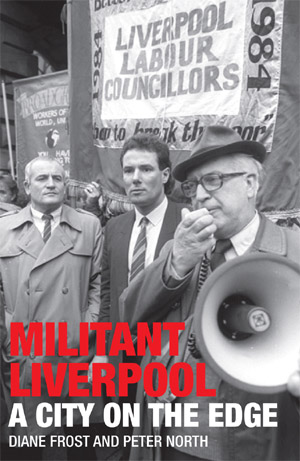
| HOME |
| NERVE |
| REVIEWS |
| ARCHIVE |
| EVENTS |
| LINKS |
| ABOUT US |
| CONTRIBUTORS |
| BACK ISSUES |
| CONTACT US |
Militant Liverpool - A City on the Edge
 Diane
Frost and Peter North
Diane
Frost and Peter North
Liverpool University Press
Reviewed by John Owen - 9/7/2013
A compilation of narratives from various political activists, some still active in the labour movement today and still kicking. The angle seems both pro and con about the epic struggle of the city council during its ill-fated battle with the national Tory administration - who seemed hellbent on reining in public spending, especially in the northern industrial areas that didn’t vote for them.
Those too young - or not even born - when the fight of Liverpool 47 Labour councillors hit the headlines may wonder what’s it all about. How does it relate to now or my life? Why is it such an important issue, to dig up the very people involved, water and hose and feed then question them on their motives reasons and youthful passions in some cases, battling the government of Iron lady aka Mrs Thatcher?
Why? Well, like her previous co authored book called Remembering the Riots 1981 - an analysis of the contentious events in Toxteth almost thirty years on - the ashes of the fire are dying down, but not completely out. It's good to contrast the opinions of the players, to see if we can learn something for today, study the past so as not to repeat the mistakes of old. Despite violent differences and extreme prejudice terminating some relations forever, the benefit of hindsight can be revealed in all its glory as wisdom. Foresight however is grasping these historical rhythms from the past and predicting the flow of events to enable the present to be delivered of the sins of the past. Amen.
So what do I think of the content? Is it an accurate portrayal a survey of broad opinions using the democratic theory of history? Or an apersonal, ahistoric, completely objective method along the lines of AJP Taylor? Applying your own fix on the facts. Alas all historians for that matter adapt the message, to suit the times they live in, or the people and places they operate within. A touch of Machiavelli operates through us all.
An aggregate of opinions making a quorum of discussion and content generated out of a workshop in 2011 may be good for social survey on cold weather payments or the use of bicycle lights in winter, but a scientific method for ascertaining the truth behind the hype or the hype of the truth? I’m not convinced.
The research seems immaculate and plausible enough, but is the aim of the book to restore, revive, rekindle through mock allegory of supposed mythmaking? By debunking the legendary stance of the Militant 47 councillors, surcharged and barred from office? For refusing to break the poor preferring instead to break the law? Joe Anderson take note.
At the time I was a young activist too and very much up for the fight against the Tory government, from going on tranquil sea of peaceniks, woolly liberals and hippy idealist of CND demonstrations to full on assault by the police during the riots of 81 and 85. Liverpool’s youth had had the Belfast policing methods, similar treatment meted out to nationalists in the Bogside, with riot police using tear gas and excessive brutal force. Thatcher’s meat in the sandwich, a very thin blue line were being used to corral the seething estates' unemployed, whose resistance showed they were not wanting to die quietly.
Politics was breathed from every lamppost and corner of the city - defiance and rebellion peaked with the miners strike. However it had been shown when Warrington’s apolitical dissolute and abandoned youth had gone to the aid of printers striking outside Eddie Shah's print factory.
Young people rotting on vast council estates were looking for a way to strike back at the hated Tory government. Their fervour and energy became focussed, an explosive power, as the riots showed. This discontent with the system, all flowed into the Militant council battle with the government. For a brief moment in time Liverpool's history it became entwined both with the Paris of 1871 and and Petrograd of 1917 October. An era of revolutionary conflagration of titanic forces was opened up. To be young and to be alive in those heady days. Death to capitalism! You could taste the smell of gunpowder in the air.
Seemed like a good idea at the time, to fight the good fight. But why didn’t it succeed? The battle didn’t produce even a good victory, only a short lived shoddy compromise, then a slow, grinding down. As fair-weather friends and staunch allies retreated, to carry on the normal functions of office, excuses were made. Scargill's army of chanting here we go fighters were cruelly driven back to eat humble pie and so too Liverpool, for daring to bite the hand that starved it.
For those interested in a good riveting rebellious tale read on Macbeth. I enjoyed it like too much trifle - a sick but satisfied feeling came over me. Would we all do it again? You bet your red cotton socks we would. I personally learned nothing from the book but the book caused a fight just on its own.